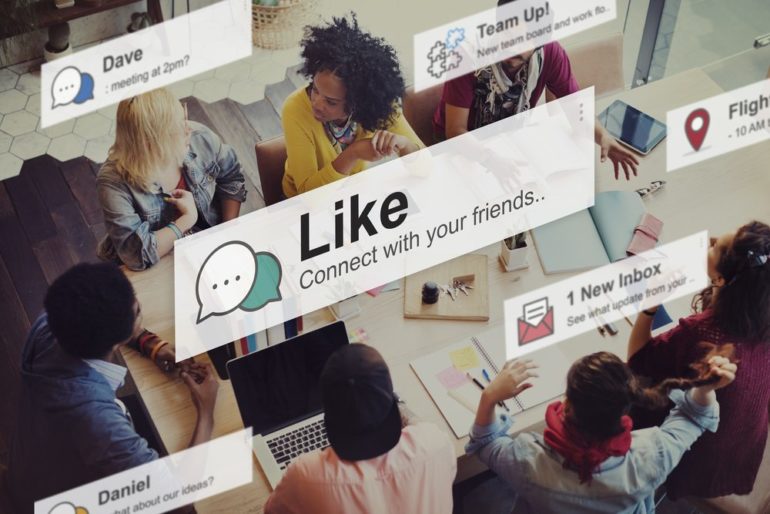Centuries ago, when daydreamers and visionaries pictured how future technology might work in our lives, the last thing they probably imagined was that the one of the biggest technological concerns for the children of the 2010s would be whether or not they can keep up their 200-day Snapchat streak.
Social technology advanced so quickly that we were unable to predict how it would impact our mental health and relationships with others. With research just starting to catch up, what we are learning is deeply unsettling – social media is causing problems for people’s self esteem, mental health, personal relationships and even employment opportunities.
Knowing what we know now, how social media will affect us in the future is a frightening prospect. I predict that social media will change us in these 5 ways – at least.
Higher rates of mental illness
It seems as though every week there is a new headline about how social media negatively impacts our mental health, with social networks being compared to sugar addictions and even hard drugs.
Recent research has found that frequent social media users are 2.7 times more likely to develop depression, and studies have found evidence that Facebook users in particular associate the network with stress and envy.
Those already predisposed to compulsive behaviour and negative thoughts patterns particularly experience a negative impact on their mental health from social media use – with literal regulation of social media, at-risk individuals are left exposed to all the damaging effects of social media.
Social media use is on the rise – it has even become a requirement for certain professions and higher education courses. With more people exposed to the negative effects of social media, and frequent use becoming more normalised, the negative impact we are already seeing on mental health will most likely increase, as will the impact on the workforce of tomorrow.
Negative impact on children and teenagers
Younger generations are the ones facing the worst of the negative effects of social media. The children of 2030 will grow up unable to imagine a world in which social technology did not exist. As it stands, the age at which children are being given phones is rapidly getting lower, and social media is being increasingly normalised.
Correspondingly, rates of mental illness in children and teenagers is increasing, and studies have found that the effect of frequent social media use negatively impacts the mental health of young people in the same way it impacts adults.
Another concern is the issue of cyber-bullying. Access to the internet and social media has changed the face of bullying among children and teenagers, making the bullying more difficult for the victims to escape and harder for teachers and parents to spot. With social technology developing faster than the rules and legislation regulating it, the issue of cyber-bullying and how it negatively impacts young people does not appear to have a quick fix, at least not while social media is so prevalent.
Lower levels of literacy
LOL is now in the Oxford Dictionary – social technology is changing the face of our language and what it means to communicate. But this isn’t necessarily a good thing for our literacy skills or our careers.
The introduction of autocorrect, abbreviations and emojis now means that writing in a particular way – a way negates the need for concentration – is becoming the norm. This means that people are focusing less on spelling and grammar, and relying more on autocorrect and auto-fill. This is all well and good for Facebook and Twitter, but poorer literacy skills will create challenges in the academic and working world, for students and professionals alike.
Losing a sense of reality
Research into social media use has found that passive social media use creates what is called a ‘self-promotion-envy spiral’. It the simplest terms, it’s that feeling of envy and inadequacy we feel when you see that person on Facebook who always seems to be on holiday, or that Instagram influencer who appears to have the perfect life.
The way we make ourselves appear on social media is an enhanced – or even sometimes completely disconnected – version of our life. But seeing page after page of perfectly curated profiles and feeds has a dramatic effect on our perception of reality, and of our selves.
As social technology becomes increasingly widespread and integrated into our lives (Google Glass anyone?) it will become even harder to distinguish between life on social media and reality, leaving more people comparing themselves to versions of others that don’t even exist.
Everyone will be on social media
In 2005, 5 per cent of adult internet users in the US reported using social media; in 2016, that number increased to 79 per cent. Given the present rate of growth, we could be looking at certain societies having 100 per cent of adults with internet access on social media.
It seems like social media is unavoidable – considering the above concerns, this is not an encouraging prospect. However, it does not have to be this way – much of the current research into social media is looking at the difference between passive and active social media use. The takeaway is that passive social media use is not good for us, but active social media use can make us feel happier, better connected and more valued by our peers.
If we want to prevent social media from changing us in the ways described, what we need is less passive scrolling through Instagram, and more engagement with social media that facilitates real-life social interactions and relationships.
Existing social media use presents as with many problems. The answer is changing how we use social media, and changing the social media we use.
Charly Harrison is the CEO of social discovery app, WHERE. She is also the founder of a campaign to Make Social Media Social Again. Follow WHERE on Twitter @ThisIsWhereUK.


